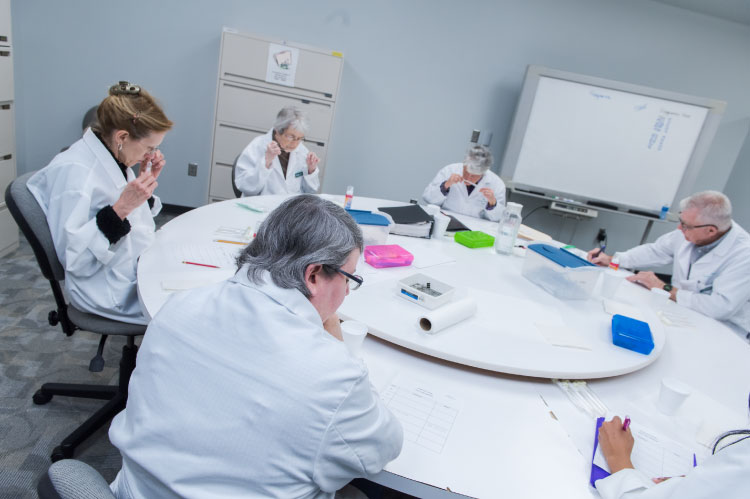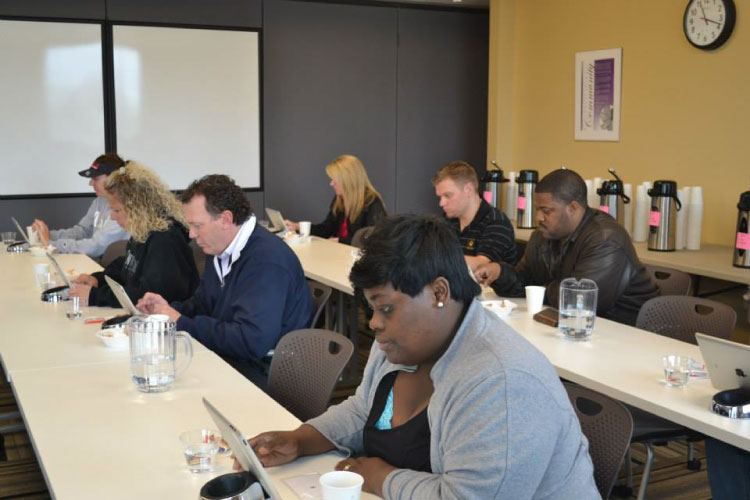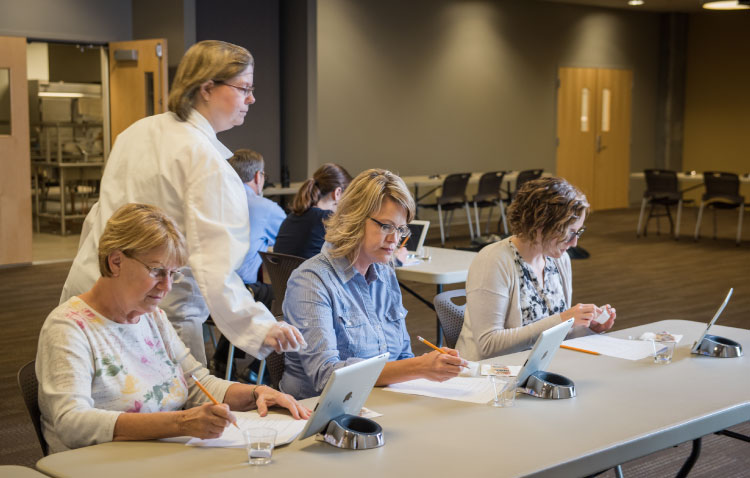The term “research” is used frequently in connection to K-State 2025, but what does this refer to, who is doing this work, and what are the purposes for K-State research? The K-State 2025 Strategic Action Plan seeks to “create a culture of excellence that results in flourishing, sustainable, and widely recognized research, scholarly and creative activities, and discovery in a variety of disciplines and endeavors that benefit society as a whole.” From a robust public research agenda to industry-focused inquiry into consumer behavior, Kansas State University engages in research in many ways for a multitude of purposes. These purposes fuel the research activity at K-State and the faculty, researchers, staff, and students who engage in them. Through a shared commitment to advancing the volume, visibility, and impact of K-State’s research activities, K-State 2025 has helped Kansas State University expand its efforts and improve its national standing—including a rise in its national rank for total research expenditures, from 75th to 68th, over the first five years of the plan (ASU Center for Measuring University Performance: Top American Research Universities Annual Report 2015). Whether the purpose is to fuel innovation and improve livelihoods or fuel the researchers themselves by improving the quality of coffee for consumers, the K-State Sensory Analysis and Consumer Research Center is making an impact on K-State’s research efforts and the broader world, one consumer behavior study—or one “cup of Joe”—at a time.
As the sun rises each day, the rich aroma of brewing java lingers through the air, and the emerging flavors fill the cups of many individuals. Coffee stimulates the brain and serves as a vehicle to caffeine. Not only does coffee have a way of erasing sleep from the eyes of many, but it is the sole source of income for millions of farmers all around the world. What happens when climate change and crop diseases become serious threats and contribute to a lower crop yield? Your morning ritual, consisting of a cup of coffee in hand, could be in jeopardy, as well as the food security and production of farming families worldwide.
The K-State Sensory Analysis Center focuses its efforts on measuring how people react to products through the five senses. The center has set out to tackle the challenges that coffee plantations have encountered and are working to advance their understanding of the quality of coffee and how it is being created. With the knowledge gained, the center created a coffee sensory "dictionary." The Sensory Lexicon and coffee Sensory Wheel developed by Edgar Chambers IV, university distinguished professor, and others at the Sensory Analysis Center, has become a gateway to helping the coffee industry worldwide. The dictionary, consisting of 110 terms, has been adopted by World Coffee Research, the Specialty Coffee Association of America and baristas across the globe, crossing the borders of Colombia, Japan, and Korea, just to name a few.

These researchers are conducting a sensory test on perfumes at the Sensory Analysis Center at Mary and Carl Ice Hall. After starting in a small lab space in Justin Hall in 1982, the center has grown and established its new facilities through K-State 2025 and generous philanthropic support. On October 24, 2013, the university dedicated Mary and Carl Ice Hall. "This building will enhance our ability to provide a host of solutions to some of today’s complex problems," said John Buckwalter, Dean of the College of Human Ecology, at the dedication ceremony.
Kansas State University and Texas A&M have leveraged the lexicon to describe the flavor of 800 varieties that are grown on test plots in six different locations around the world. “We developed the Lexicon, Texas A&M tests the Lexicon to make sure it is consistent, and then we work together to get the varieties evaluated,” said Chambers. This long-term process enables researchers to craft new variations of coffee, through traditional genetic means, that flourish in warmer climates and have a higher disease resilience. "You can change the world, one product, one person, one day at a time," said Chambers.
Coffee is just one of the many products that the center uses to conduct studies. “If you can taste it, touch it, feel it, or hear it, then we work on it,” said Chambers. For nearly 30 years, the center has worked with 100 domestic and international companies, providing them with confidential and effective solutions.

This coffee research is taking place with community research participants in the Sensory Analysis Center's satellite location at K-State Olathe. The center is engaged in research at the Manhattan campus, K-State Olathe, and many other locations throughout the world.
The center is not merely confined to the realm of the Manhattan and Olathe campuses. The research being conducted has engaged 20 different countries, including the U.S., Argentina, Colombia, Spain, Russia, Estonia, India, South Korea, Egypt, Turkey, and Thailand. Through the meaningful collaborations, the center has maintained a facility at Kasetsart University in Bangkok for almost ten years, as well as a facility at Miguel Hernandez University in Spain.
As students strive for a master’s or doctoral degree emphasizing sensory analysis, they are provided with an unparalleled educational opportunity both in and out of the classroom and laboratory. “Students are required to obtain a three-month to one-year experience as an intern with a leading company. We’ve had students do work with PepsiCo, Avon, S.C. Johnson, and several others,” Chambers said, “they are also required to engage in an international experience; these requirements set our program apart from others across the nation.”
The Sensory Analysis Center is ranked top in the world and the work of three university researchers has gained recognition by The Journal of Sensory Studies. In a list of 784 individuals, Edgar Chambers IV, director of the center and university distinguished professor of food, nutrition, dietetics and health, ranked No. 1; Delores Chambers, co-director of the center, ranked No. 5; and Kadri Koppel, assistant professor of food, nutrition, dietetics and health, ranked No. 40. The rankings were determined based on research articles published and number of citations from 2009 and 2015.

This Sensory Analysis taste test is being conducted at K-State Olathe. The growth and partnership at K-State Olathe has expanded the Sensory Analysis Center's capacity in a number of ways, including through the hire of new teaching and research faculty in Olathe.
“In order to be a top research university, we have to be unique and relevant," said Chambers. Through the unique expertise and resources present at the university, in addition to the public and private partnerships being developed by the Sensory Analysis Center, K-State has established itself as a national leader in this field of study. One of the first things Chambers shares with students is, "it's all about collaboration; the more you collaborate, the more powerful your teaching, research, and outreach will be," he said. A strong network of academic, governmental, and industry connections will allow researchers to engage more deeply and effectively in the purposes for their work, and it also helps provide more relevance or, as Chambers refers to it, the "so what" behind the data being collected. "The rankings and recognition tell us that the work we do is useful to people," said Chambers. "Our research is used by people every day, which is exactly what we want."
The K-State College of Human Ecology engages in a diverse array of research activity, from consumer behavior in areas like food, food safety, and textiles, to healthy relationships, global health and nutrition, and aging. This research brings value to students through hands-on engagement that will be applied directly by a given company or within a particular field. "Our research activity is helping prepare the next generation of professionals across a number of different fields," said John Buckwalter, Dean of the College of Human Ecology. In addition, K-State's research helps fulfill a multitude of purposes within those fields. "These companies and partners need this work done, and they need it done by people who know what they're doing," said Buckwalter. "We're able to provide this expertise, and it makes for a win-win situation."
In a number of ways and for many purposes, K-State’s research, scholarly and creative activities, and discovery make an impact in the world. And, as coffee contributes fuel to K-State’s research efforts, the research of the Sensory Analysis Center will help improve the quality of this fuel for consumers worldwide. K-State’s ability to positively impact markets for producers and consumers alike has been greatly improved by K-State 2025 and consumer behavior research university-wide. When combined with its other research engagements, this work has helped the university achieve consistent growth in its total research expenditures—from $160.7 million to $188.7 million throughout the first five years of K-State 2025. This momentum, and its impacts, will persist as K-State continues on its path towards becoming a top 50 public research university by 2025.
